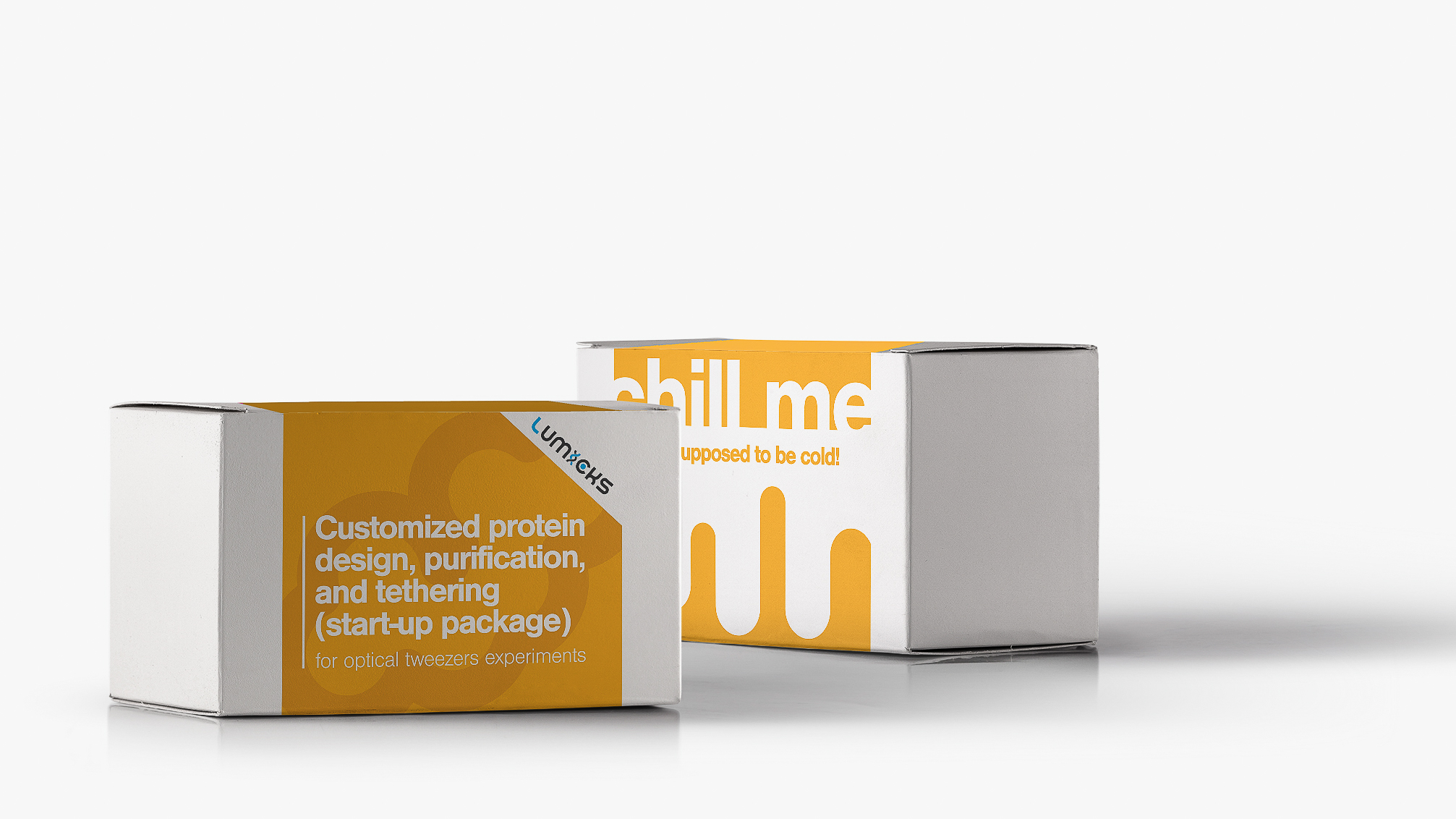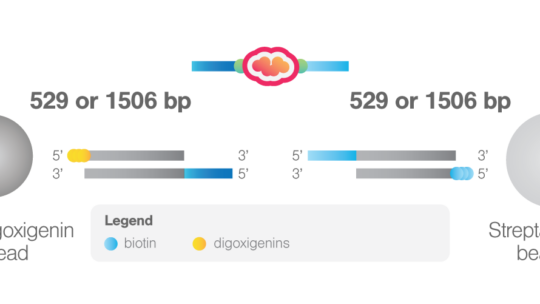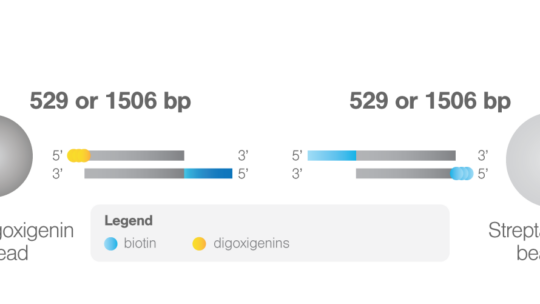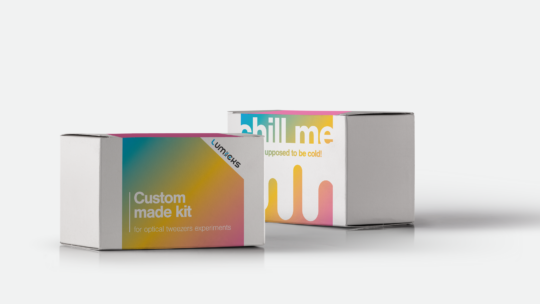Customized protein design, purification, and tethering (start-up package)
Please contact us through e-mail with your request.
We now offer services that help you design, purify, and label your protein of interest for optical-tweezers experiments that measure protein folding and conformational dynamics. The service is a stepwise process, in which we together determine the optimal labeling protocol design for your specific protein and experiment. The designed protein is next purified for subsequent preparation with the Protein tethering kit (cysteine or ybbR), which is included in the start-up package. The final C-Trap experiments can either be performed in your own lab or by one of our experts.
Our service relieves you from costs and time that are typically required for personnel training, troubleshooting, experiment optimization, and custom application development. After finishing the start-up package, new materials can easily be ordered as a recurring package.
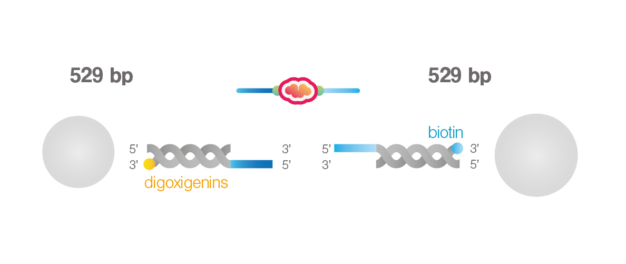
Estimated for 2 weeks of measurements
Estimated 3 months delivery time (typical)
Service Phases Description
Phase 1: Experimental design and cDNA synthesis
LUMICKS analyzes protein sequences and structures to establish a subsequent strategy for protein purification and functionalization with DNA handles. Based on these analyses, we can determine the optimal cDNA sequence that will synthesize your protein of interest.(Research grade, 4 µg). During this phase of the project, we evaluate the probability of success based on the analysis and resolution of the protein structures.
Phase 2: Protein expression and purification
Upon establishing the protein solubility, LUMICKS will proceed with the protein purification. We use the expression vectors obtained in Phase 1 to express and purify your protein of interest. We transduce the expression vectors encoding your protein of interest (Phase 1) E.coli and induce protein expression using small scale total cell lysates. Upon detection of protein expression, we will proceed purifying the proteins using the 6xHis affinity tag. We provide quality assurance through SDS-PAGE and western blot validations.
Phase 3: DNA linker attachment and quality control
Next, we conjugate the purified protein to oligonucleotides using either cysteine-maleimide chemistry or the ybbR tag/Sfp system. Finally, we anneal the oligonucleotides of the protein–DNA chimeras to the biotin and digoxigenin handles, respectively. Quality assurance is provided from the tethering to the bead trapping with the C-Trap optical tweezers.
Of note, we can express and purify proteins in mammalian cells or insect cells upon request.
Product Resources
Want to learn more?
See our Protein Folding and Conformational Changes application notes.
Want to use this product in practice?
Find out more about the C-Trap here.
Specifications (cysteine kit)
Maleimide-modified oligonucleotides:
Dry pellet (not visible), 2 vials. Lyophilized oligonucleotides for protein labeling using maleimide–cysteine chemistry. Store at
-20°C
Biotinylated and digoxigenin-labeled DNA handles (529 bp):
4 μl, 10 vials. Handles mix (50/50) with an overhang complementing the maleimide-modified oligonucleotides. Store at
-80°C
TCEP (10 mM):
5 μl, 2 vials | 10 mM. Reducing agent. Store at
-80°C
Customized protein:
40 μl | 0.5 μg/μl (20 μM). Store at
-80°C
Streptavidin-coated silica beads (⌀ 1.0–1.4 μm):
25 μl | 1% (w/v). Beads in PBS with 3 mM sodium azide, with a specific diameter (e.g., 1.2 μm) within the given range. Store at +4°C
Anti-digoxigenin-coated polystyrene beads (⌀ 0.7–0.9 μm):
60 μl | 0.1% (w/v). Beads in PBS with 3 mM sodium azide, with a specific diameter (e.g., 0.8 μm) within the given range. Store at +4°C
Download the Full Specifications or View the Experimental Protocols
Specifications (ybbR kit)
CoA-modified oligonucleotides:
20 μl, 2 vials. Oligonucleotides for protein labeling using the enzymatic reaction of Sfp synthetase. Store at -80°C.
Biotinylated and digoxigenin-labeled DNA handles (529 bp):
4 μl, 10 vials. Handles mix (50/50) with an overhang complementing the CoA-modified oligonucleotides. Store at -80°C.
Sfp enzyme:
5 μl, 2 vials. Store at -80°C.
10x Sfp reaction buffer:
50 μl | 10x. Store at -80°C.
TCEP (100 mM):
5 μl, 2 vials | 100 mM. Reducing agent. Store at -80°C.
Customized protein:
15 μl – 1.25 μg/μl (50 μM). Store at -80°C.
Streptavidin-coated silica beads (⌀ 1.0–1.4 μm):
25 μl | 1% (w/v). Beads in PBS with 3 mM sodium azide, with a specific diameter (e.g., 1.2 μm) within the given range. Store at +4°C.
Anti-digoxigenin-coated polystyrene beads (⌀0.7–0.9μm):
60μl| 0.1%. Beads in PBS with 3 mM sodium azide, with specific diameter (e.g., 0.8 μm) within the given range. Store at +4°C.
Download the Full Specifications or View the Experimental Protocols


